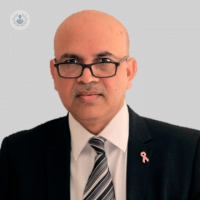Male breast cancer: Symptoms, diagnosis and treatment
Written by:About one per cent of breast cancer cases in the UK occur in males. Whilst it's a small percentage, its impact on the person, his family and friends can be as devastating as in women. We spoke with the highly-experienced consultant breast surgeon, Mr Kislaya Kumar Thakur, FRCS, to discuss this condition, including the risk factors, symptoms, tests and treatment.

What is male breast cancer?
Male breast cancer is cancer of the male breast glandular tissue (yes, men have breast tissue too!). The most common types are: ductal (arising from ducts), lobular (arising from glandular tissue/lobules), Paget’s (involving ducts in the nipple). Less common types include inflammatory breast cancer.
Though much less common than in women, men need to be more aware of this condition as it tends to present at a later stage than in women.
How common is it?
In the UK, the chances are one in 900. In Europe, less than one per cent of all breast cancers are in men, though it varies around the world. In sub–Saharan Africa, five to fifteen per cent of breast cancers are in men.
In the UK, the ratio between men and women with breast cancer is 1:200. This has implications for treatment and prognosis.
What are the risk factors?
The main risk factor apart from older age (most male breast cancers are in the 60 to 70 age group) is overall increased circulating oestrogen in men (from within the body or given from outside) which can be caused by:
- Testicular operations for undescended testes
- Testicle damage because of past infections like mumps
- Patients or people given therapeutic oestrogens in prostate cancer or transgender men who have had oestrogen treatment
- Obesity or being significantly overweight
- Chronic liver disease or scarring like cirrhosis
- Klinefelter’s syndrome (XXY chromosomes instead of XY) with hormonal imbalance
Other risk factors include:
- Strong family history of breast or ovarian cancer especially those with BRCA genetic mutations
- Radiotherapy to the chest area during teenage years for lymphomas
- Some ethnicities and ancestry are more prone (for example, black men living in Africa) to male breast cancer. It is less common in Japanese people.
- Working in hot environments
What are the main symptoms of male breast cancer?
The main presentation for male breast cancers is with a breast lump or swelling (in seventy-five per cent of cases) and lumps in the armpit (axillary area). Usually these are painless to start with. The second most common is changes in the nipple area (nipple retraction, nipple discharge-clear/blood-stained, alteration, rash, ulceration etc).
When should I see a doctor?
Essentially, anyone with breast swelling or lump, especially in men over 45 to 50 years of age or with any of the symptoms or changes in the nipple as mentioned above.
Also, both women and men with risk factors should have a discussion with a specialist about modification of lifestyle factors and monitoring, screening or genetic testing
What tests are available to diagnose it?
Ultrasound as well as mammograms in men should be advised if there are any of the symptoms mentioned previously, or if there is any doubt. A needle test or biopsy (usually ultrasound-guided) is performed under local anaesthetic if any abnormality is found.
Once diagnosed, men with breast cancer might need staging tests like CT-scans, Nuclear medicine bone scans or MRI scans, amongst others to establish the extent of spread as this will determine the type and combination of treatments.
What treatments are offered?
Treatments are similar to those for women with breast cancer, with surgery being the most important. More men need mastectomy compared with women though it's less common for men to be suitable for breast conserving surgery.
They might also need lymph-node assessment from the armpit by a technique called Sentinel Node Biopsy. If nodal involvement is proven by this or at diagnosis by a needle test, then they would need removal of all lymph-nodes (Axillary Node Clearance).
The other treatments considered are radiotherapy (X-Ray treatment) or anti-hormonal treatment with tablets like Tamoxifen or Letrozole and chemotherapy (drug treatment given through veins).
What is the outlook for men with breast cancer?
Stage for stage, the prognosis is similar to breast cancer in women. However, as men present to doctors later because of lack of awareness, or other factors, they are often diagnosed with larger tumours or larger cancers at a higher stage involving skin, lymph-nodes or distant organs (forty-five per cent are diagnosed in stage 3 and 4).
So, the overall survival rate is worse in men because they present later and at a higher stage, hence the need for increased awareness of breast cancer in men.
If you require breast cancer screening, we recommend booking an appointment with leading breast surgeon Mr Kislaya Kumar Thakur. Visit his Top Doctors profile for information on appointment availability.


